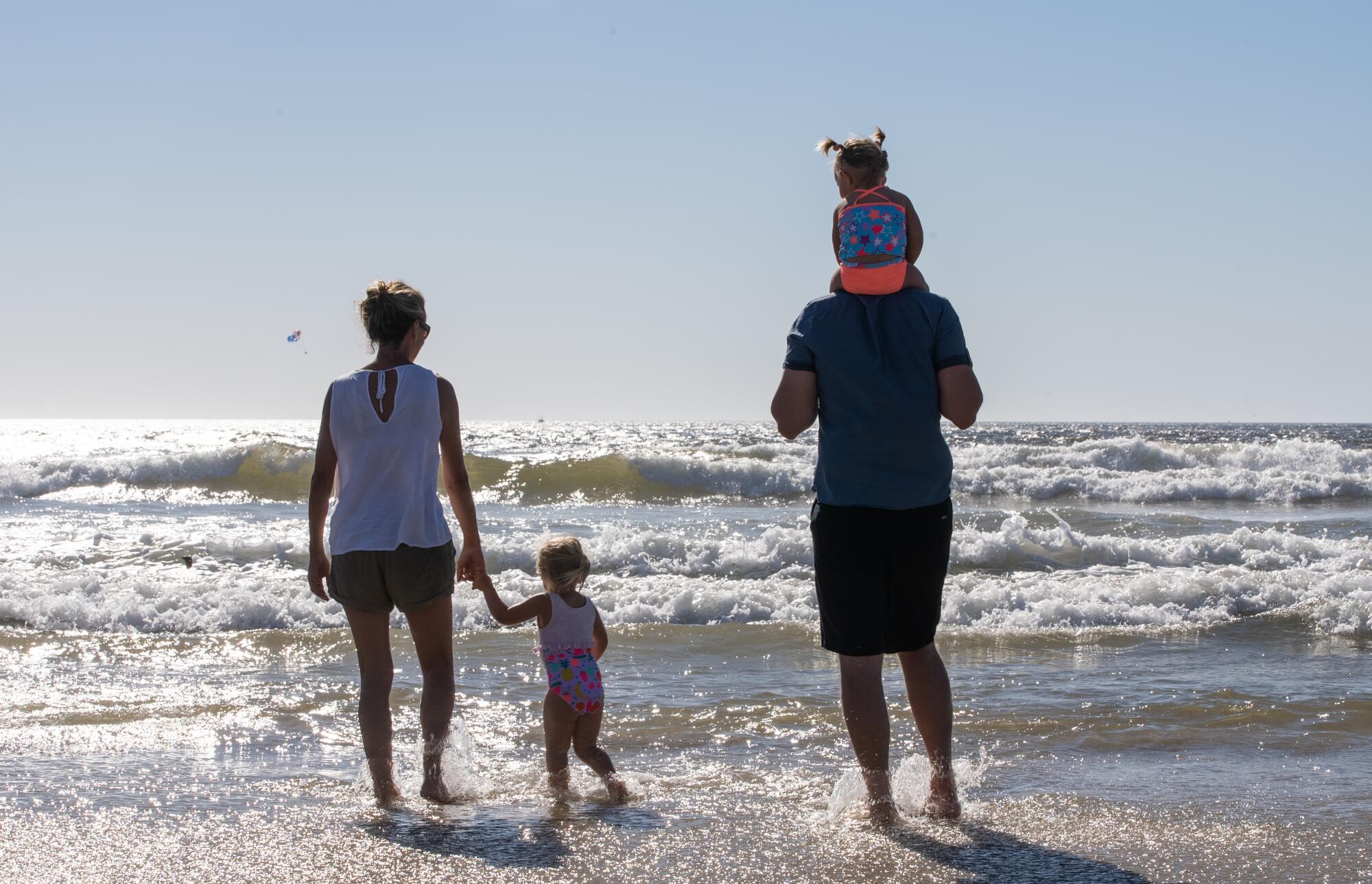
- Share via
SAN DIEGO — As a single mother in her mid-20s, Lilly Frost was working as a beautician when she saw a Craigslist ad for egg donors and decided she could use the money.
The experience of helping a woman who she said had lost her only child to a drunk driver was so rewarding that Frost launched her own company recruiting other donors. “Once I started getting into that,” she said, “I found a lot of joy.”
Before long she moved into the related business of surrogacy, matching couples with women who would give birth to their children. But as Frost tells it, she couldn’t stop thinking about how unfair it seemed that more people couldn’t afford a surrogate birth, which typically costs more than $150,000 — and can easily reach double that.
“I was seeing my clients mortgaging their house, liquidating retirement accounts … to afford these services,” she told a San Diego news site in 2015.
So she turned to a solution common in many industries: outsourcing.
Couples could save “over 60% compared to US options” by using surrogates in Mexico, her website advertised, touting “ethical, transparent and quality surrogacy affordable to couples all over the world.”
In a multibillion-dollar industry built on the dreams of would-be parents, Frost told many of her clients in emails that she could provide something few others would dare: a guarantee. For a flat fee — covering in vitro fertilization, legal expenses, surrogates and their medical bills — she promised customers they would become parents, no matter how many IVF attempts or miscarriages occurred.

Subscribers get exclusive access to this story
We’re offering L.A. Times subscribers special access to our best journalism. Thank you for your support.
Explore more Subscriber Exclusive content.
She treated many clients like friends, trading texts and sharing details of her life as a mother of three. Once in her orbit, they reviewed catalogs of surrogates, wired payments and delivered sperm samples.
But hundreds of thousands of dollars later, many of them had no baby — and Frost was out of business and under FBI investigation.
The collapse of her enterprise and its trail of heartbreak provide a look at what can go wrong in the largely unregulated surrogacy industry.
The Times interviewed more than two dozen of Frost’s former clients, surrogates and business associates and reviewed thousands of pages of emails and texts, court filings, contracts, banking documents, medical records and complaints submitted to state and federal agencies.
What emerged is the story of how Frost kept her operation going even as mounting failures made clear that her business plan was too good to be true.
“She had brilliantly hidden everything beneath the surface,” said one client, Gabrielle Ackerman, whose surrogate in Mexico miscarried because of what the doctor acknowledged was inadequate medical care. “We had no idea we were stepping into the most horrific chapter of our lives.”
::

In 1978, an infant in England named Louise Joy Brown made headlines around the world as the first person born after being conceived through IVF.
Four decades later, more than 8 million babies have been created that way, and the fertility industry brims with clinics, sperm and egg donation businesses, counselors and consultants.
Surrogacy is one of the most expensive options.
Ethically and legally fraught — imagine if a couple or a surrogate backed out once she was already pregnant — it is banned in many countries because they view it as exploitative. But the industry has grown steadily in the United States, where by one estimate it accounts for about 2,000 births a year.
California has become a nexus, in large part because it has fewer obstacles for same-sex couples and single people, who in many other states are required to adopt the baby from the surrogate.
With little government oversight, the industry has been prone to scandal.
In 2006, a surrogacy coordinator in California was arrested for stealing tens of thousands of dollars from clients. Five years later, conspirators in a baby-selling ring pleaded guilty to wire fraud after they’d coaxed women to Ukraine to bear children and sold their babies for more than $100,000 each.
In 2017, Acharyya Rupak, the founder of Planet Hospital, a company based in Southern California that coordinated cross-border surrogacy, was sentenced to prison for international racketeering for mismanaging client funds. One of its contractors was Frost’s egg business, My Donor Cycle. Neither Frost nor her company were charged with a crime.
On the websites for that company and her newer venture, Surrogacy Beyond Borders, Frost listed several doctors in California and Mexico, plus a team of lawyers, social workers and field coordinators. At the top of one staff page was a headshot of Frost grinning, her blonde hair tumbling down her crisp white blouse.
Various bios she posted online said that she had a business degree from Portland State University in Oregon and that she had helped found the Society for Ethics in Egg Donation and Surrogacy, a nonprofit set up to promote fair treatment of donors, surrogates and parents.
Ackerman, a business consultant from Colorado, was impressed. She had no easy way of knowing that Frost had never graduated from Portland State. Or that the co-founders of the ethics group refused to let her join after discovering her cross-border work.
Doctors had told Ackerman that the removal of tumors on her uterus made it unlikely she could ever give birth, but her eggs were still healthy.
In 2016, she and her husband, Matt, an investment broker, chose to do IVF with American doctors. Rather than offer a fixed-price guarantee, Frost sold them on a deal in which a surrogate from Mexico would make trips to the U.S. for embryo implantation and to give birth.

The couple paid Frost $20,000 upfront, then put an additional $70,000 in an escrow account to draw from as other expenses arose.
Within a year, the account was down to $29,690 and three attempts to get the surrogate pregnant had failed.
Promising a “smooth and successful process going forward,” Frost then sold the couple on a new $30,500 plan that would be carried out entirely in Mexico with a surrogate in Cancun.
“I am pleased to tell you Itzel had an appointment today and the baby is growing very well,” she emailed in November 2017. “She will be traveling to Mexico City next month and will likely remain until delivery.”
But about 28 weeks into her pregnancy, without going to Mexico City, Itzel was diagnosed with preeclampsia, a complication that can become deadly for the mother. The fetus — a boy — didn’t survive.

Dr. José Gaytán, who treated the surrogate, wrote an email to Ackerman explaining that the medical infrastructure in Cancun was ill-equipped to handle infants born prematurely and that his team decided “to try to keep the pregnancy going as long as possible.”
“This things are always terrible and I never get used to it,” he wrote.
Frost emailed her condolences. Ackerman replied with a plea for answers.
“From the day we started there have been so many mistakes in our program, mixed stories and wrong decisions,” she wrote. “This is the end.”
The stillborn baby was cremated. Frost said nothing remained in the escrow account, but she promised to personally deliver the ashes.
Ackerman said they never arrived.
::
Ackerman’s experience with Frost was not unique: The business’ efforts to save money were backfiring elsewhere.
In Switzerland, Enzo Serratore and his partner, who found their dreams of parenthood blocked by a ban on adoption by same-sex couples, turned to Frost and were matched with a surrogate in 2018. But she repeatedly tested positive for sexually transmitted infections.
After Frost denied his request for a refund, Serratore agreed to a new surrogate — who came back with the same infections. Increasingly skeptical, he asked for a record of how his cash deposit had been spent and how much was left. Frost responded that it was all gone.
“Of course we track the expenses,” she told him in an email. “We simply don’t provide them to clients.”
In all, the 51-year-old banker spent $55,000.
Frost was falling into financial distress, even as she looked for new business opportunities, including a yoga and sensory deprivation tank studio she opened in 2019.
The greatest financial threat to her surrogacy business was also what came to be her biggest selling point: the promised guarantee.
“Keep in mind this is a full guarantee program regardless of miscarriage,” she emailed one client, Miguel Bravo, a 43-year-old real estate investor from San Diego. In the spring of 2020, he noticed that $53,000 he had in escrow had been withdrawn even though he was still early in the process. Frost explained over WhatsApp that “the funds go to pay for the multiple IVfs and donor expenses.”
“I don’t want to be caught up in a Ponzi where you may fall short on funds and need new money to come in from others to pay for next stages and treatments,” Bravo replied. The “escrow was to secure the process and now any security is gone.”
Frost became harder to reach and often texted excuses for missing his calls. She was driving. Her phone had been stolen. She had the flu. A stranger “dumped acid” in her water.
Still, Bravo tried to maintain faith.
“I picked you because you reminded me of my sister,” he messaged.
“I hope you can still trust me,” she replied. “I have been in business for more years than most agencies and have never had any issues with fund management or not completing cycles. I do understand the fear though. Hopefully the check you did on me at the start helps that a bit. :-)”
In fact, her business model had long since spun out of control.
Frost said in an interview that the key problem was an inexplicable decline in IVF success rates, which, because of the guarantee, forced her to pay for many more procedures than she anticipated. And when the pandemic hit and the number of new clients dropped off, she lost her ability to cover escalating expenses.
But those weren’t the only issues, as one client learned when Frost texted him some bad news about his surrogate a few weeks before her due date.
“I am so sad to inform you it seems Sandra may have been lying this whole time about the pregnancy,” she wrote on March 22, 2020.
The client, a 39-year-old engineer from the Bay Area, was one of several who spoke on condition that their names not be published, because their experiences left them deeply ashamed.
He took a closer look at the ultrasound images he’d been receiving for months and realized the dates had been cropped out. The pregnancy photos had been posted for years on his surrogate’s Facebook page.
On a phone call that he recorded, an out-of-breath Frost blamed the surrogate for misleading both of them and apologized over and over, promising to make things right. But months later, a Mexican clinic threatened to stop working with him because Frost had failed to send the payment.
“Why do you keep doing things unbelievable to us?” he emailed her. “Please be a human!”
After spending $169,000, he and his partner were still childless.
In another case, a surrogate who was supposed to deliver her baby in California was turned away by border guards and wound up giving birth in Tijuana.
The client, a European diplomat, flew to Mexico for the birth. But the proper paperwork was never completed, and he now shares custody of his daughter with the surrogate.
As the pandemic set in and Frost struggled to sign up new customers, the situation grew more dire for the existing ones.
Gary Christie, an education professor at Baldwin Wallace University outside Cleveland, had turned to Frost in 2018. He didn’t have a spouse, but he yearned for twins, even if it meant raising them on his own. He had arranged a sabbatical around their planned arrival.
But after more than two years of delays — stalled genetic testing, a surrogate with an infection, multiple unsuccessful embryo transfers — Christie gave up.
He had spent $96,250 — more than his annual salary.
“Apart from the financial and emotional toll it has taken on him,” his lawyer wrote to Frost, “he has lost years with his future children which he can never recover.”
- Share via
Watch L.A. Times Today at 7 p.m. on Spectrum News 1 on Channel 1 or live stream on the Spectrum News App. Palos Verdes Peninsula and Orange County viewers can watch on Cox Systems on channel 99.
::
The savings that Frost promised her clients came in large part from how little she had to pay the surrogates in Mexico.
The going rate in the United States ranges from about $45,000 for a first-timer to $80,000 for someone who has done it before and therefore is considered reliable. Frost told clients she paid their surrogates $14,000 — a little less than the average worker in Mexico makes in a year. The deal included some living expenses.
She said the surrogates “were often single mothers, who saw an opportunity to continue their education or purchase a house for their family, while providing this service for our clients.”
Dr. Azul Torres, an IVF cycle coordinator in Cancun, said many of the surrogates were poor and would arrive at her clinic with little understanding of how invasive the process would be.
“I don’t think they knew the scope of what they were doing,” she said.
A 32-year-old mother in Guadalajara — one of several surrogates who spoke on condition their names not be published — said she had dropped out of university and was looking for a way to pay off debt and open a business selling clothing.
“It was the option that would help my family, and it also seemed noble — to give the gift to another mother,” she said.
Like many, she had discovered Frost from one of her online ads.
In a YouTube promotion posted in 2014, five surrogates in Cancun offered testimonials about their experience, including living together under the supervision of a house mother.
“I’m very happy here,” said Dayren, 25. “Everything I’ve been told has been true. The house is very pretty and I’m very comfortable.”
But as the business hit financial trouble, surrogates began to suffer.
One who had gestational diabetes and a urinary tract infection emailed Frost and various associates in August 2020 pleading for medical care, which she said had been denied because Surrogacy Beyond Borders had left clinic bills unpaid.
“I’m putting my life at risk,” she wrote in Spanish.
“Lilly, This is VERY ALARMING,” replied Kristen Armstrong, a lawyer who often represented Frost’s customers. “Why is she not being paid? Why has she not received medical attention in the US? What is going on?!”
“Apologies - I have now sent her payment,” Frost emailed back the next day.
Surrogates said in interviews they were often told that the couples for whom they had become pregnant were withholding payments — unaware that many had paid upfront for fixed-price packages.
One said she charged unpaid hospital bills to her personal credit card, having no other choice.
“This agency has left me feeling used, scarred and stressed out,” a surrogate who spoke to The Times wrote in an online review. “Parents, do not work with this awful woman.”
A lawyer working with Frost texted one surrogate to ask her to keep costs down by skipping doctor-ordered bed rest.
In an email to The Times, Frost said she was unaware of any cases in which surrogates were asked to skip bed rest or cover their own medical bills.
::
Most of Frost’s clients experiencing problems didn’t realize there were other people like them. Each case — with its particular misfortunes — existed in isolation.
That began to change in late 2020, when several received a letter from Biofertility Center Guadalajara saying that it was ceasing business with Frost because she was pressuring doctors to cut costs.
Then in spring 2021, after a concerned employee who worked for Surrogacy Beyond Borders started introducing clients to one another, they began swapping stories and demanding answers from Frost.
She told them that she was struggling to attract new business, the money was running out and that her marriage was falling apart.
“I am doing the divorce thing and need to keep my finances sorted with the house asset,” she texted one client. “I haven’t sold new cases in quite a long time so I am self funding all of this chaos. It is doable in the end but right now cash is very very tight.”
Álvaro García Morillo, a client in Seville, Spain, who said he lost $70,000, took to the internet.
“She is destroying my life economically and psychologically,” the 42-year-old banker wrote in a Google review.
Paul Hard, a 63-year-old professor from Alabama who started paying his surrogate and other expenses directly because Frost had failed to do so, started a Facebook support group.
He called it “Frosted.”

By summer, the FBI was talking to clients, according to emails they shared. The San Diego district attorney’s office also began looking at Frost but — as it explained in a letter to one of her clients — suspended its investigation after learning that the FBI was conducting its own and that it was “significantly more advanced.”
“Due to the pending nature of the investigation we are unable to comment at this time,” a spokeswoman for the federal agency said in an email to The Times on Friday.
On Oct. 3, Frost emailed clients saying that their money was gone and that she was “unable to generate the revenue” needed to press on. Her company, she wrote, “is completely insolvent.”
::
Frost, now 37, has moved to the suburbs of Portland. In an interview there, and later in text messages and emails, she described the downfall of her business, saying that she was “devastated” by her program’s failures but that the problems were beyond her control.
“The couples that I’ve worked with that were not able to make it through — I understand the gravity of what that means,” she said through tears. “I spent my entire life trying to help couples.”
From her perspective, it was “bad luck at every corner” — from IVF failures to pandemic travel restrictions that left newborns trapped without their parents for up to seven months.
She portrayed herself as a victim of her own good intentions, saying she drained her retirement account and sold her house in San Diego to try to honor her obligations to clients and surrogates alike.
“I didn’t start or run this business to become rich,” she said in a text message. “I kept fees the lowest possible and prioritized access for the masses vs personal gain.”
Frost said some solace comes from the more than 150 clients who now have children because of her surrogacy business. She declined to put The Times in touch with any.
The husband from whom she is separated — Neal Markowitz, a lawyer who frequently represented her clients in the legal work necessary for surrogacy arrangements — said that the business plan had been too optimistic.
“Like any other business, there was a risk calculation, and the calculation was wrong,” he said. “That’s how lots of businesses go under.”
Frost said some clients also had unrealistic expectations. Surrogates prove unreliable. Pregnancies fail.
She also pointed out that some customers apparently never read their formal contracts, which are at odds with the promises she made to clients.
The misspelling aside, her standard contract states: “COMPANY PROVIDES NO GAURANTEES.”
::
Several families attempted to reclaim their funds, but their lawyers told them Frost probably had few assets left to pursue. Others were too distraught to try.
Ackerman and her husband moved to San Diego this year. She sat quietly at the kitchen table on a recent afternoon watching the sun ricochet off Mission Bay.
Suddenly she rose to her feet. Her daughters had awakened from their naps and were babbling downstairs.
Sienna emerged wearing a single left pigtail and settled into her highchair to chomp on a homemade popsicle. Then Imogen sauntered in clutching several toy dinosaurs.

The girls were born in 2019 and 2020 to surrogates in Ukraine. Ackerman visited a fertility clinic in Kyiv weeks after the miscarriage in Mexico.
“Pick your head up,” she said the doctors told her and her husband. “You have a sad story, but people from America always do.”
They are now suing Frost in hopes of recovering some of the $150,000 they say they spent. Frost has denied wrongdoing, and the case is scheduled to go to trial in September.
Ackerman said her biggest source of anxiety is not knowing for sure what happened to the remaining embryos.
“I’m holding onto hope that our other embryos weren’t sold,” she said. “I worry someone is going to call me one day after a DNA search and say, ‘I’m yours.’”
More to Read
Sign up for This Evening's Big Stories
Catch up on the day with the 7 biggest L.A. Times stories in your inbox every weekday evening.
You may occasionally receive promotional content from the Los Angeles Times.












